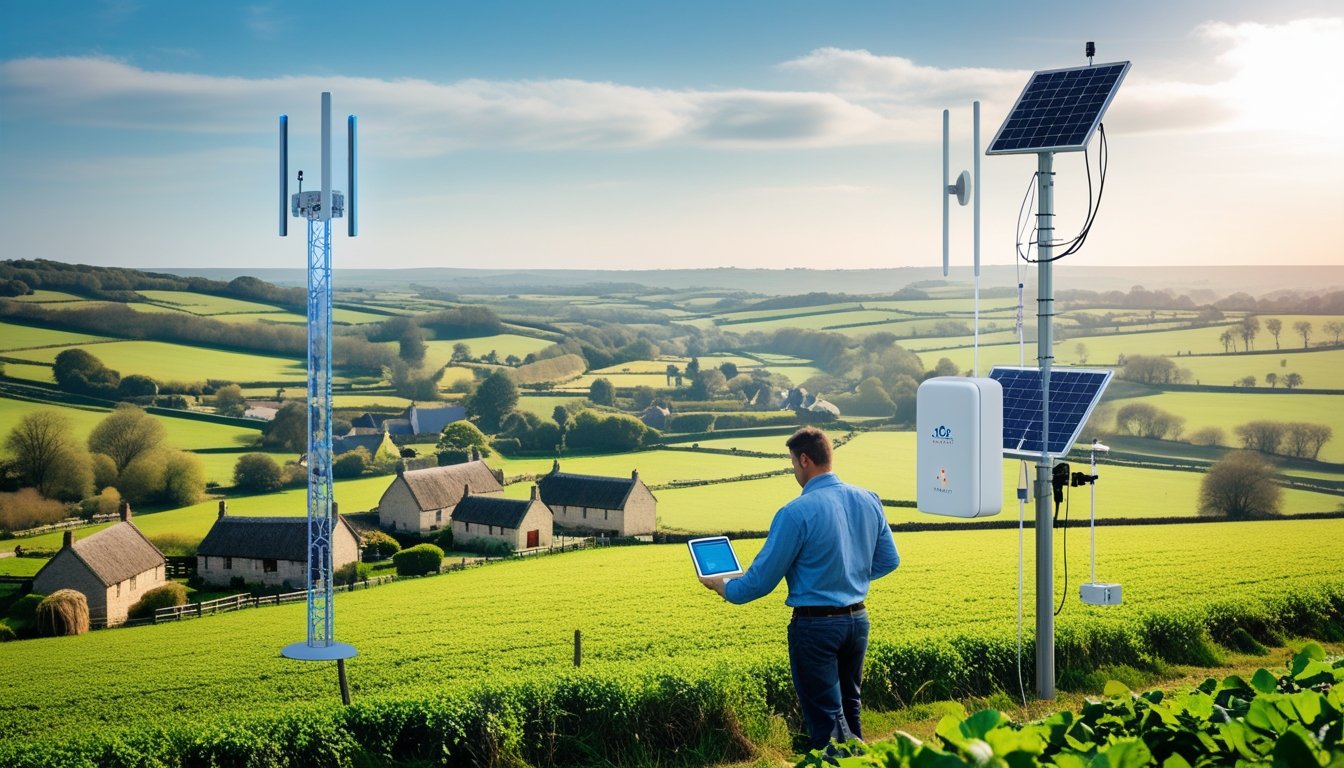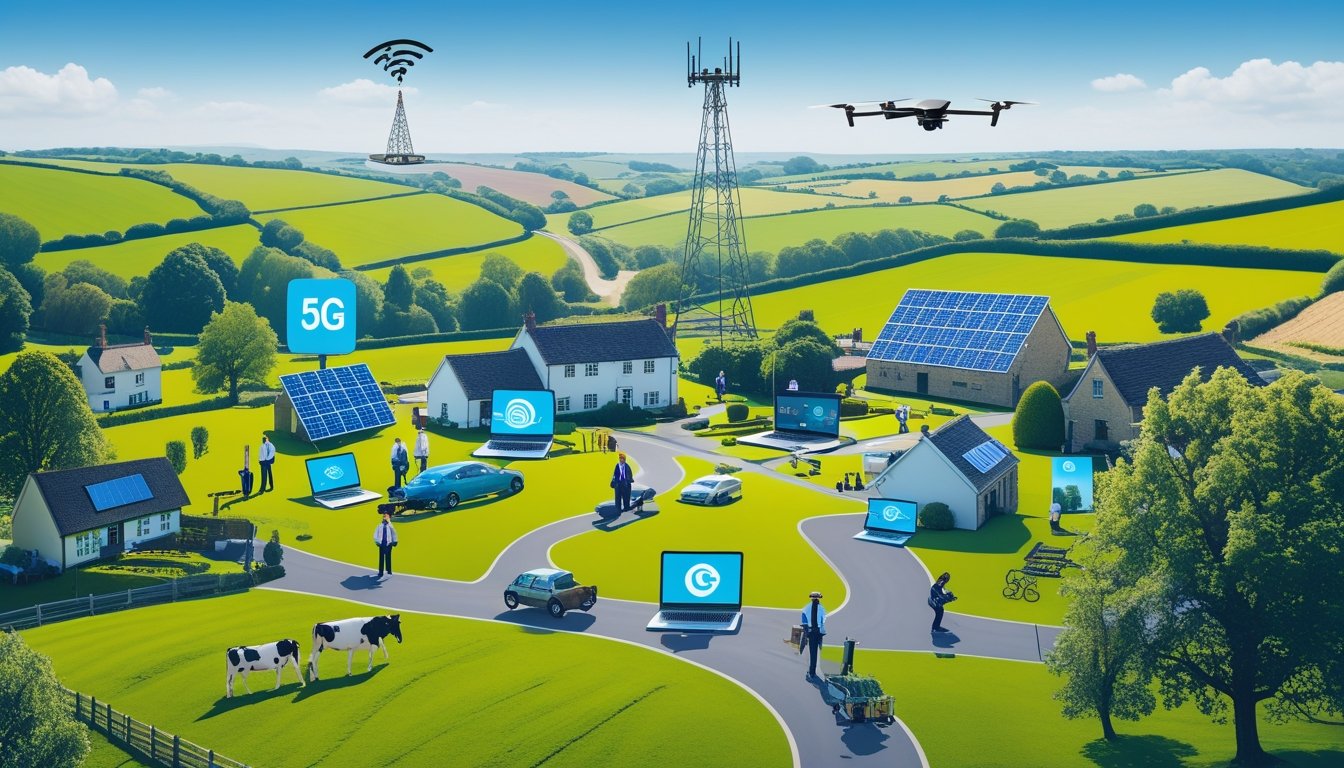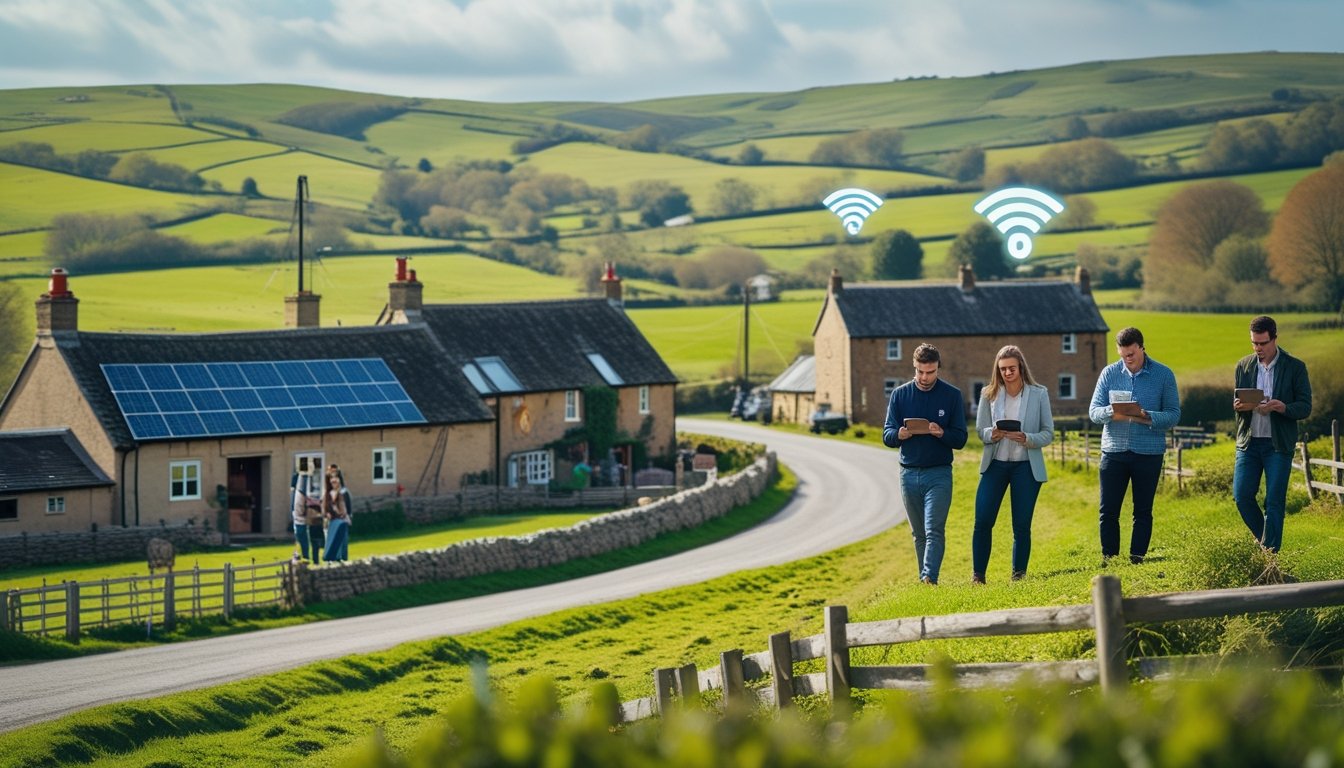Late updated: 15 Jul 2025 11:07
Written by: Oliver Bennett
UK's Smart Countryside Future of Rural Connectivity: Revolutionising Remote Areas
In the heart of the UK, rural areas are embarking on an exciting journey toward becoming "Smart Countrysides". As technology advances, so does our ability to bridge the connectivity gap that has long separated rural communities from their urban counterparts. Enhanced rural connectivity promises to unlock significant economic and social benefits, paving the way for sustainable growth and development.

From integrating AI-driven solutions to leveraging 5G technology, we are witnessing a transformation that goes beyond improving internet speeds. This digital revolution is set to usher in a new era of opportunities across sectors such as agriculture, healthcare, and tourism. These advancements offer a glimpse into a future where rural communities can thrive both economically and socially.
As we explore the potential of this digital transformation, we invite you to consider the implications for our collective future. How might a "Smart Countryside" change the fabric of rural life and the broader UK landscape?
Key Takeaways
- Rural connectivity enhances economic and social growth.
- Smart technologies transform UK rural life.
- Digital transformation is vital for sustainable progress.
Transforming Rural Connectivity Across the UK
As digital inclusivity becomes more crucial, several initiatives are reshaping rural connectivity in the UK. Government efforts and regulatory measures aim to bridge the digital divide and enhance broadband access in underserved areas. The collective response ensures faster internet for the countryside, fostering economic growth and improving daily life.
Government Initiatives for Digital Inclusion
The UK government has prioritised digital inclusion within rural areas to address connectivity challenges. Notable policies include targeted funding to enhance broadband infrastructure. A focus on extending 5G connectivity to remote locations supports economic development and enables better access to essential services. These initiatives aim to close the digital divide between urban and rural settings, supporting communities in navigating a technology-driven world.
Research conducted in the Great Rural Revival report indicates significant benefits for the economy. Rural advances open opportunities for employment and innovation, fostering a robust framework for connectivity nationwide. The government continues to promote digital inclusion by ensuring that no area, however remote, is left behind in this digital era.
Role of Ofcom in Regulating Rural Broadband
Ofcom, the UK's communications regulator, plays a critical role in the oversight and implementation of broadband services in rural regions. By setting performance standards and monitoring compliance, Ofcom ensures that broadband providers deliver on their commitments to expand rural connectivity. This regulatory oversight is essential for maintaining a competitive and fair market.
Our collaboration with Ofcom has led to initiatives encouraging investment in rural infrastructure, crucial for addressing connectivity disparities. Standards set by the regulator require providers to deliver specific service levels, enhancing the quality and reach of internet access. Ofcom's regulatory framework underpins efforts to realise digital connectivity goals across the countryside.
Project Gigabit and Nationwide Gigabit Broadband Rollout
Project Gigabit forms a significant part of the UK's strategy to deliver high-speed internet to rural communities. This ambitious initiative aims to equip underserved areas with gigabit-capable broadband, which represents ultra-fast internet connections necessary in today’s world. By partnering with local providers, Project Gigabit enhances coverage and enables the implementation of cutting-edge technology infrastructures.
Government partnerships with local providers are instrumental in facilitating widespread deployment. Coupled with significant funding commitments, these joint efforts ensure timely rollout and improved access. Our focus remains on transforming the rural digital landscape, facilitating growth and ensuring residents and businesses have access to state-of-the-art broadband solutions.
The Smart Countryside: Driving Digital Transformation and Economic Growth

Digital transformation in rural areas is reshaping the UK countryside, integrating emerging technologies into everyday life. This shift not only fuels economic growth but also narrows the digital divide, creating new opportunities for businesses and communities alike.
Emerging Technologies in the Digital Economy
Emerging technologies serve as a catalyst for economic growth in the countryside, transforming traditional practices and creating innovative solutions. Artificial Intelligence (AI) and Internet of Things (IoT) technologies optimise agricultural operations, increase yield, and improve resource management. These advancements enable rural businesses to compete in global markets, generate new revenue streams, and create jobs.
Furthermore, blockchain technology ensures transparency and traceability in supply chains, while smart sensors enhance precision farming. The digital economy drives rural prosperity by harnessing these technologies to boost productivity and sustainability.
5G and Fixed Wireless Access in Rural Areas
Expanding 5G and fixed wireless access into rural areas is crucial for connectivity. 5G networks offer high-speed internet and low latency, enabling real-time data transfer and enhanced communication for residents and enterprises. Rural areas benefit significantly from 5G's capabilities, which facilitate improvements in telemedicine and distance learning, and support remote work opportunities.
Fixed wireless access serves as an efficient alternative where laying fibres is impractical. By bridging connectivity gaps, these technologies empower rural communities, ensuring they participate fully in the digital economy and contribute to national economic goals.
Bridging the Digital Divide Through Innovation
The digital divide remains a significant challenge in rural communities, impacting social cohesion and economic development. Innovative strategies are essential for addressing these disparities. Local initiatives, such as community broadband projects and digital literacy programmes, play a pivotal role in closing this gap.
Government policies, coupled with private sector investments, provide necessary infrastructure and resources. These efforts ensure equitable access to digital tools and opportunities, fostering an inclusive environment for rural innovation and entrepreneurship. Through concerted efforts, we can eliminate the barriers that prevent rural areas from thriving in a digital age.
Frequently Asked Questions

Rural UK stands on the brink of a connectivity revolution, with 5G technology and smart infrastructure paving the way. These advancements promise to bridge the digital divide and unlock new opportunities for local businesses and communities.
What initiatives are in place to improve internet connectivity in rural UK areas?
Efforts to enhance rural internet connectivity include projects like the Smart Rural initiative, which significantly invests in 5G infrastructure. This aims to provide high-speed internet access across countryside areas, offering over £2 billion in potential economic benefits by modernising agricultural sectors and improving overall rural connectivity.
How will the advancement of smart technology benefit UK countryside communities?
Smart technology fosters sustainability and efficiency in rural areas. By integrating smart farming methods and optimising resource use, communities can achieve higher crop yields and more competitive market positions. Enhanced connectivity also revitalises these regions by allowing better access to services and supporting social and economic activities.
What measures are being taken to ensure equitable digital access in rural and urban areas of the UK?
National efforts focus on reducing the digital divide between rural and urban areas. Policies aim to ensure that rural communities receive the same quality of internet service as urban centres. This involves targeted investments in infrastructure and initiatives designed to upgrade digital services across all locations in the UK.
How is the UK government supporting the deployment of 5G in rural areas?
The UK government plays a vital role in advancing 5G deployment by partnering with private firms and funding infrastructure projects. These measures ensure that rural areas benefit from 5G's swift speeds and reliable connectivity, which are crucial for supporting modern agriculture, remote education, and healthcare services.
In what ways can local businesses in the UK's countryside areas benefit from enhanced connectivity?
Improved connectivity unlocks new opportunities for rural businesses, enhancing productivity and competitive edge. Businesses can leverage digital tools for efficient operations, access wider markets, and utilise online platforms to reach customers. The potential for economic growth is significant, given that over half a million rural businesses could gain from better digital access.
What challenges must be overcome to achieve a fully connected rural UK?
Achieving full connectivity involves overcoming infrastructural and financial challenges. Rural terrains often complicate the installation of networks, requiring strategic investments and collaborative efforts between the government and private sectors. Ensuring sustained funding and addressing the specific needs of rural communities are crucial for realising a fully connected future.
